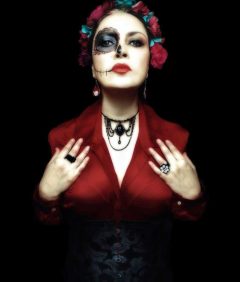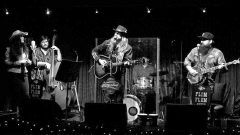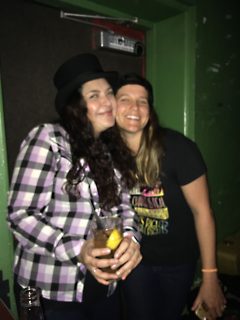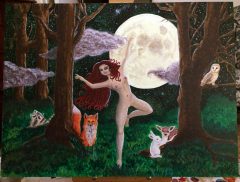Featured Stories
Julia Sage: Spiritual Warrior
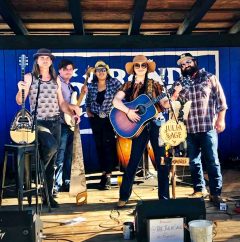
Julia (with guitar) with the Bad Hombres, Drew Douglas (aka Grandpa Drew), Chad Pittman, Natasha Cruz, and Matthew Strachota.
When they said World War lll would be fought with information they failed to mention that every single one of us would be on the front lines, or that we would be fighting against and amongst ourselves, or that the fire hose of falsehoods we are inundated with every day would infiltrate and infect everything we do such that their foul odor would permeate and fester inside our very thoughts even as we sleep. Somewhere along the line this place went from somewhat daffy to downright looney biscuits.
A great plague has befallen the world; there rules a “king” who wants nothing more than to cast everything he touches into his own graven, hollow image. The populace is now perfectly polarized and the dismantling of its most hallowed institutions has begun. Hate boils over on all sides and poisons the wells of progress and discourse. Language, words, and the very ideas they convey have become mired in a fog so thick as to render all meaning inherently meaningless. Gold is the new god and those who worship at its altar spare no expense in its acquisition and never recoil from the notion of sacrificing others in their quest for more than they could ever possibly hope to spend. Knowledge itself, once the first bastion in the journey towards progress and a better world for all has fallen victim to the denizens of the New Inquisition. Hope lies crestfallen; blood runs in the streets. The future, fellow sinners, is bleak.
We have to find the sunshine wherever we can, rage against the dying of the something something, and if a ray of light is found it must be shared so that it can grow into something bigger than itself. I have such a glimmer of radiation for you this morning. Her name is Julia Sage, local songwriter, vagabond, gypsy, piratess, pistolera, cabaretiere, vampira. She changes hats often, wears many faces, and appears to be imbued with a wealthy variety of sentient spirits.
She keeps some questionable company, choosing to rove with bands of Bad Hombres and Flim Flam Revues since she first littered our shores sometime back in the 20th century. She calls her music South Americana, a blend of beautiful Chilean folk and protest songs with all the raw ugliness of American blues, country, bluegrass, and, of course, rock ‘n’ roll.
In times of crisis such as we find ourselves today, Ms. Sage emits an aura of positivity that can replenish the corrupted soul, give insight to the blind, redeem the foul wicked, and, at times, perhaps even miraculously mend the broken heart. In a world that is searing in self-hatred, she is bursting with fruit flavor. Her voice will haunt your dreams in all the best possible ways.
SDT: Tell the world who you are.
JS: I’m Julia Sage. I’m a musician songwriter in San Diego. I’ve been here for 22 years. I was born in Santiago, Chile in 19 [mysterious gust of wind] and I grew up there. I started writing music when I was eight, started learning guitar at 14. My dad taught me how to play. I immediately started writing. I was not a good person to learn cover songs. As soon as I could, I wanted to write my own songs. The first things I started writing were pretty much politically inclined, since we were living in a dictatorship so most of my early songs were reflecting what was going on at the time. I joined a band and we gained a little bit of traction, we opened for some national acts, and then I decided to stop and go to college, so I left it.
SDT: Why?
JS: I was the only child in my family out of six that had the opportunity to go to college. As I was finishing college I met a guy and, yadda yadda yadda, we moved to San Diego.
SDT: Wait, you yadda yadda’d over the best part.
JS: No, I mentioned moving to San Diego. I got used to it and I had never had my freedom before, had never left home before. And since I left at 19, I really grew up here, still a kid basically, and over the years San Diego has become home for me.
SDT: There’s a global pandemic going on right now that we would be very remiss not to acknowledge and talk about. How have you been coping with the lockdowns? Staying positive or succumbing to the nihilism?
JS: I’ve gone through stages. I get depressed. I got to kind of a dark place when it started because we couldn’t go anywhere and I was totally isolated and stressed out. I couldn’t write. Music just wasn’t coming to me like it usually does, which is very frustrating. I can’t exactly remember the time but eventually something just changed. I started writing and suddenly the music just came pouring out like crazy, songs about everything, as in all the shit that’s going on. I went back to the political side, all the movements going on right now. At first it was the isolation songs, then it moved into the political and then into the hopeful.
SDT: What’s your take on the state of society right now? What are the issues that are striking a particular chord with you?
JS: Immigration issues—I’ve been through a lot of that— and the Black Lives Matter movement because I can’t believe that stuff is still going on and there’s no end in sight even though they say it’s changing. Also, the government making mistake after mistake—it’s like you’re seeing a boat sink and there’s not a whole lot you can really do about it even though you have the best intentions.
SDT: If you’re powerless to do anything about it, why not just give up?
JS: No, that’s not what you do.
SDT: That’s what I do! Quitting is the coolest! Come over to the darkness Julia, the void could use someone like you.
JS: You just adapt. That’s been my thing since I was a child. You adapt to the times and push forward. You figure something out. That’s what I’ve been doing, especially with the music situation. My life is my band and that’s what keeps me alive and going. Not being able to do that really got to me for a while, but then when Matt [Strachota, from the Bad Hombre]’s birthday was coming up, I got everybody together and we went out to his house to surprise him and we hung out in his yard, wore masks, stayed six feet apart, and just played and jammed together and my heart just opened up again. There was no choice there. I was the happiest I’ve been in months.
SDT: How do you find the fortitude or energy to keep moving forward? Where does it come from? Eventually, you have to find something within yourself. What is it within you that’s driving you to do positive things in the face of all this adversity?
JS: I go through different moods but it’s like a wave that I have to ride and then I find that I am grateful that I’m not in a bad situation. There’s a lot of things going on but I have food, I have music, I have my friends—a good circle of friends that are really strong and good people. It’s like a little bubble, my inner circle, and it gives me energy knowing that I have those good things in my life.
SDT: Going back to immigration, expand on the issues and maybe give us some magical solutions.
JS: I play with Grampa Drew’s Flim Flam Revue at the Whistle Stop and we would do a thing every month. We’d do some benefits sometimes and donate the money to causes. One of them was the Border Angels. They help people.
SDT: Is that the guys in the white suits and coffee can that try to bum your change?
JS: No.
SDT: Ok good, those guys are a total ripoff.
JS: No, the Border Angels are people that actually help immigrants and they are amazing. I’m writing a song I’m going to release and donate the proceeds to them. There’s another group called the Armadillos, and they go out into the desert and actually try to find people who get lost. There are a lot of people doing good things out there that you never hear about, and those are the kind of people I like to help. I’m not rich or anything but I do what I can with what I have.
************
Note: I later spoke with the Border Angels who told me they are an organization that advocates for human rights, immigration reform, and social justice, educating and assisting communities in the United States and Mexico. I then spoke with the Armadillos who told me they are small leathery critters who live in the desert. THEN I spoke with a rep from Armadillos Busqueda y Rescate, which is a group of volunteers who go out and rescue folks who get lost crossing the border. Preferably before they die out there, but not always. It’s a tough gig. Both foundations are always looking for volunteers and donations (borderangels.org, facebook.com/ArmadillosBusquedaYRescate).
************
SDT: Some of your songs are reminiscent of Nueva Cancion Chilena.
JS: Songwriters from way back when. I was inspired by them in my first few songs and when I started writing.
SDT: Why?
JS: Because it was a protest against unfairness and government oppression.
SDT: How old were you when you first heard it and it had some effect on you?
JS: When I was five years old. Violeta Parra died very young and other people took over the movement. When I was a teenager it was Los Prisioneros. They were pretty big and they had a lot of political content to their music too.
SDT: Is that what inspired you to also write music that had a socially conscious bent to it?
JS: Yes, and my mother was a big influence on me, too; she was always very fair and giving to people who were in need, and I grew up with that mindset as well. I always want to sing about things that are the truth.
SDT: Where do you find the truth? Society has been having issues with discrepancies in the way we view it such that nobody can even agree on what anything really means anymore. How do you figure out what your truth is and is that in any way in alignment with any sort of universal truth if there is one?
JS: I wouldn’t call it a universal truth but I do believe in a universal conscience. I’ve had many experiences showing me that. But as far as truth, I’m going to tell you what I tell all my friends; give me facts that YOU actually went and found out yourself and studied all the things that you needed to study in order to show me your point or don’t even talk to me about it unless you can back it up.
SDT: (crumples up 3 pages of unresearched questions he was going to ask) So if it can be true to them but not true to you then how can it be considered the Truth?
JS: In this case I’m talking more about presidential truth.
SDT: I don’t think there is any.
JS: Exactly! So, what comes out of their mouth is how I judge in that area. When somebody I like is trying to convince me that this is a good position that we’re in right now, I just point out what this person just said and question how anybody can stand by that. If it’s real you can’t fake it. As far as my own truth? Do unto others. That’s my motto. And in the event that I do fail (as I’m not perfect) I try to make amends.
SDT: Do you think there comes a time where we can at least find a point, or get to some kind of middle ground of agreeance as a society?
JS: As a society, I doubt it. I believe we can on a small level. A very, very small level. But if you combine all those little groups that can start thinking the same way, there’s a chance. It’s going to take a lot to change people’s minds though, for sure.
************
We’re at the crossroads now. Used to be every individual dwelt within the confines of their own uncertainty, displaying publicly their façade of unity and control and all gadding about pretending they know what’s going to happen from one day to the next.
Nowadays, not so much. Oh, individual alienation is still a thing, as are the false masques of security people still wear. The times, however, have changed. We are now all sharing a shroud of ambivalence prominent enough to be seen clearly, yet too far out of reach to be handily dealt with. The lonely must now feel alone amidst the entire rest of the population.
As for art itself, already back-burnered amidst a society that learns with every passing generation to value it less, yet always finding a way to prevail, it too finds itself in crisis. The state of the music industry is a good example. Live music venues shut down, large gatherings prohibited, musicians left with no way to ply their trade via live performance. Their only plausible option is live streaming on the internet, the cold, barren, vacuum of cyberspace devouring the fleeting shreds of our humanity, the Black Widow lures you to plug in once again and turn off your minds. “Come on in,” she says, “the web is warm.” Plucking harp-like the strings of her lattice and sending out those irresistible vibes to lull you into a false sense of succor, whispering gently in your ear the sweet siren song: “Dank memes, nice dreams, baby rhinos, more followers, doom-scrolling, sick burns, crushy comments, Insta me, Venmo me.” The lure is down, the trap is set, the game is you. But we all know how this ends, enticed with promises of all she can give while knowing nothing of what she takes you’re rapt, in a silk tortilla while your eyes glaze over and your brain turns to pudding, your final vision the last of what’s left of you being devoured by the Widow, the Queen of the Web, the true abyss at the center of everything, with eight eyes to hold you, eight legs wrapped around your velvet rims, showing you fully the mark of the blood red hourglass on her abdomen so that no doubt can be left that your time is up.
A streamed live music performance being in the end merely a two-dimensional projection on a screen to be passively viewed by an audience of isolationists from the comfort of their homes is the antithesis of the reason why one goes to see a show, yet these days it seems to be the only alternative. Shows are live, in person, social interactive events that cannot be replicated, duplicated, or replaced by a digital imitation without taking away the very thing that makes it special, that makes us feel like alive, active participants in the experience of the human condition.
Of course, none of this is permanent. Live music will return. When is a good question. But the truly relevant one is how? Is it going to be like it was? Well, look at everything else. Is anything going to be like it was? That’s the fun part. We just don’t know. So, if this worldwide pandemic has you feeling alone, isolated, cut off from the rest of society, then welcome to the club—the club that has everybody in it, the set that contains all sets. We can now all be together in our loneliness. We can all be singularly isolated, together.
************
SDT: The local music scene is pretty much torpedoed at this point. You’re still in contact with your other band members, what about the rest of the community? How is it holding up at this juncture from your perspective?
JS: I think everybody’s going through the same waves that I have been through and there’s not really an end in sight right now, so we’re all just kind of riding it out. We’re trying to figure it out. I’m also involved with several groups of musicians. For the last year and a half I’ve been a part of Lady Brain Collective. Everybody in that group is amazing.
SDT: Explain what the Lady Brain Collective is.
JS: Lady Brain is a women’s group, and I say women loosely because it’s anybody that identifies as a woman.
SDT: So, if I’m a man on the outside but I feel like a woman on the inside I could probably join?
JS: Probably, yeah.
SDT: What if I’m a man through and through but I just want to help anyway?
JS: Then no, you can’t join. It’s just for ladies.
SDT: That’s sexism! I am outraged.
JS: It basically evolved from just having too much testosterone in the field that we’re in, so it’s an organization like Lilith Fair. The last show I played before all this started going down was one of the things at the Whistle Stop, and I took over with Lady Brain. It was all women performing that day and it was the most amazing show we’ve had. A lot of really good people. So, like I said, we’re trying to figure things out, taking breaks because we’re all going through the moods, but just doing a little bit of live streaming on Facebook, porch concerts, driveway concerts. I miss playing a real show, though. You can’t feel that same energy on a live stream, but when you get in there and you see the comments and see people talking to each other, at least you get some connection. Another thing that’s also opened up is collaborating with people that you usually wouldn’t. You just send tracks back and forth or now you can Zoom it.
SDT: It’s inevitable that live shows and performances will come back. Look into your crystal ball and tell me what things about them will be the same and what will be different.
JS: I think the feeling is going to be the same. It doesn’t matter how many people you are playing to as long as they are in person—just having the people watching you and interacting with you—that’s going to be the same. As far as what’s going to be different, I’m hoping that this is going to wake up some kind of fire to treat musicians a little bit better. I know everybody loves music but nobody wants to pay for it, and musicians aren’t valued like maybe they should be. We make this our lives and people can’t live without music; it’s one of the things that is so intrinsic to human nature that it’s weird that people don’t appreciate it more until they lose it.
SDT: They can live without it but in a much more barren existence where the loss of art is the loss of our culture and the loss of parts of our commonality. You know, the smart parts. There’s a pretty long list of reasons why having so many dumb people is bad for everybody, including people too dumb to realize that, but the arts are a way for us to hold a mirror up to ourselves and, of course, appreciate the things we like, but, more important, to come to terms with the things we don’t. But the value of being able to reflect on why we do the things we do is pointless for those among us who refuse to even look.
JS: I’m always trying to figure out ways to make more and do more not just for myself but for all the musicians than has been done so far. It’s like with all the arts, people always want it for free and it’s not appreciated as much as it should be. They don’t think about all the years that you put into it, all the training, all the equipment, all the money that you put into it, because god knows we spend a lot of money, too, but they think we’re doing it just for the love of it, which is true, but we also need to eat. I would do it for free because, like I said, it’s what keeps me alive, it’s what I love, but it’s just not realistic.
SDT: Don’t tell THEM you’ll do it for free, you’ll never make another dime.
JS: I’d do it for free for a good cause, let’s just say that. But otherwise that is something that needs to change eventually. Everybody is suffering right now so I’m taking it easy, seeing where it goes, and doing what I can to help things along.
SDT: Any interest in experimental quantum physics?
JS: In what way?
SDT: Do you think it could be messing with the fabric of reality?
JS: I’m honestly not that big into conspiracies. I think science is really important and is valuable for a lot of practical things
SDT: Well, there doesn’t have to be a conspiracy for them to be experimenting with things they don’t yet understand and having that result in some very negative consequences.
JS: Yes, but experimenting is how they discover things right? We have to try things.
SDT: What if they try things and then screw them up worse than it already was because they didn’t know what they were doing?
JS: But what if they do the opposite? What if they discover some really cool thing that’s going to help the world?
SDT: I have to say I admire your optimism. What do you dream about?
JS: Everybody who knows me well knows that I have the weirdest dreams in the world. I dream that I have energy coming out of my hands and I’m fighting demons and monsters and things like that with white lightning coming out of my hands.
SDT: What are the demons trying to do to you?
JS: To me nothing. They’re always trying to get other people. I’m always trying to save people in my dreams. I also have premonitory dreams that I can actually see what is going to happen sometimes.
SDT: Did you have a premonitory dream that psychic abilities was the next thing I was going to ask you about?
JS: No.
SDT: Mmm-hm. When did you dream about something that ended up happening?
JS: What it is is that I meet people in my dreams before I meet them in person, so I think I’m a little bit witch, too.
SDT: Where are you going to be when the zombies come?
JS: Alright, so zombies are the one thing that freaks the hell out of me! My sister took me to see Night of the Living Dead when I was eight years old. I lost my mind when people would get eaten by the ones they loved. So, when the Zombie Apocalypse begins, I’m probably going to be somewhere with a really good weapon. It kind of depends, though, because if we’re in a world where the zombies can run really fast then I think we’re screwed, but if it’s the ones where that are slow and stupid, I think we can survive it.
SDT: Slow, stupid zombies. Sounds like some people I know.
JS: Well, if I find somebody that’s a zombie but is somebody that I used to know or is part of my family, then I probably wouldn’t kill them. I wouldn’t have the heart.
SDT: Pssh. That’s how you get taken out, girl. Maybe you can cure them with your white lightning Wonder Woman hands. Any good ghost stories or interactions with the supernatural?
JS: I do! There are stories in my family about my grandparents walking around their house sometime after they died. I’ve never seen anything, but I’ve felt things. I do believe there is an energy that stays around after someone dies.
************
We reminisce about the stories of a past we can never get back, but you must never forget that the stories of your future are still waiting to be lived by you, and without you they can never be. Julia Sage will be part of the soundtrack to the tales we will tell when Shit Show 2020 finally comes to an end. You’ll know her. She’ll be the one bringing light to the darkness, hope to the downtrodden, and laser hands for zombie kills. You can bet she will be at the forefront of the resurgence, singing songs of feeling for impure hearts, and with a wisp of wind and a flurry of smoke, like the cruel mistress you wish she could be, like all great entertainers who leave you wanting more, you’ll feel her presence when she is in your midst and her omnipresence in the emptiness she leaves in her wake, until sleep comes, glorious time, her sweet oblivion in the dark….










